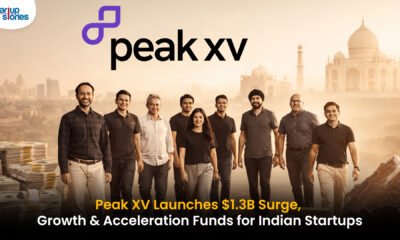Latest News
NVIDIA CEO Jensen Huang Calls on India to Lead AI Revolution, Not Just Export Software!

During a conversation with Tech Today’s Aayush Ailawadi, NVIDIA CEO Jensen Huang emphasized India’s potential to become a leader in the AI revolution, urging the country not to repeat history by becoming just a back office for AI development. Huang stressed that India, which played a key role in the IT revolution, should now focus on manufacturing intelligence locally rather than exporting software and talent abroad.
Insights from the Discussion
Ailawadi asked Huang how India could avoid the pitfall of becoming an outsourcing hub for AI, similar to its role during the IT boom. In response, Huang highlighted India’s unique position, saying:
“That’s exactly why we’re here. My discussion with Prime Minister Modi focused on this. Why export software and labor while the real development happens elsewhere? India has the data, infrastructure, and energy to build AI solutions domestically and export intelligence globally.”
Opportunities for Local Development
Huang pointed out that with AI models like LLaMA 3, which use open-source technology, India could create its own digital intelligence tailored to local needs. He also noted the opportunity to leverage India’s global diaspora by developing technology that serves cultural preferences.
“Millions of Indians worldwide want content in Hindi or other regional languages. That intelligence should be developed in India and shared globally.”
Strategic Collaborations
NVIDIA’s collaborations with Indian tech companies reflect a strategic shift towards positioning India as a global hub for AI development, moving away from its traditional role as a service provider to becoming a producer of AI-driven solutions.
Importance of Infrastructure
Huang emphasized that India’s existing data infrastructure and technological capabilities provide a solid foundation for developing advanced AI solutions. He believes that fostering local talent and innovation will be crucial for realizing this vision.
The Role of Government Support
The conversation also touched on the importance of government policies in promoting AI research and development. Huang urged Indian policymakers to create an environment conducive to innovation, including support for startups and investment in education focused on AI technologies.
Future Prospects
As India continues to invest in its digital infrastructure and talent pool, Huang’s call for local development could lead to significant advancements in AI capabilities within the country. By focusing on building indigenous solutions, India can not only enhance its technological landscape but also establish itself as a key player in the global AI market.
Conclusion
Jensen Huang’s insights underscore the potential for India to take a leadership role in the AI revolution by prioritizing local development over outsourcing. As Indian companies and government bodies collaborate to harness the power of AI, the nation stands poised to transform its technological landscape and contribute meaningfully to global advancements in artificial intelligence.
This proactive approach could ultimately position India at the forefront of innovation, enabling it to shape the future of AI while meeting both domestic and international demands for intelligent solutions.
Latest News
Peak XV New Funds: $1.3B Commitment for India Startup Surge 2026

Peak XV Partners has launched three new funds totaling $1.3 billion, targeting India’s booming startup ecosystem. The lineup features the $600M Surge fund (8th edition) for early-stage ventures, a $300M Growth Fund for Series B+ scaling, and a $400M Acceleration Fund for rapid portfolio expansion. This commitment arrives as India’s VC inflows rebound, with AI and fintech leading 2026 trends.
These funds build on Peak XV’s legacy of backing unicorns like Zomato and Pine Labs, offering founders capital plus strategic guidance amid post-winter recovery. Early-stage deals surged 20% last year per Tracxn, positioning Peak XV to fuel the next wave of innovation in SaaS, climate tech, and consumer plays.
For startups eyeing Peak XV new funds or Surge fund 2026 applications, this signals prime opportunities. Investors and marketers should watch for deployment updates India remains a global VC hotspot.
Latest News
D2C Brand Neeman’s Raises $4 Million for Tier 2/3 Store Expansion & Eco-Friendly Shoes

Hyderabad, January 13, 2026 Neeman’s, India’s leading D2C footwear brand famed for sustainable shoes and patented PIXLL® technology, has raised $4 million from existing investors. This funding boosts its cumulative capital past $10 million since 2015, with a post-money valuation nearing $50 million. CEO Vijay Chahoria emphasized offline retail as the “next frontier,” planning 50+ new stores in Tier 2/3 cities like Jaipur and Lucknow to blend eco-friendly innovation with hands-on customer experiences.
In India’s booming D2C ecosystem where footwear sales hit ₹1.2 lakh crore in 2025 Neeman’s targets hybrid retail amid high online CAC and 25-30% returns. Backed by vegan, machine-washable shoes priced ₹2,000-4,000, the brand leverages PIXLL® (5x more breathable than leather) for carbon-neutral comfort. Recent 5x revenue growth to ₹100 crore ARR, 1M+ pairs sold via Myntra and stores, and awards at India D2C Summit 2025 position it ahead of rivals like Paaduks.
Neeman’s offline expansion India eyes the $15B sustainable footwear market by 2028, fueled by PLI schemes, Gen Z’s 70% eco-preference (Nielsen), and Southeast Asia exports. Challenges like real estate costs are offset by data-driven inventory and omnichannel QR tech. Watch for Q1 2026 launches in Hyderabad and Bengaluru redefining D2C success through authentic, “Wear the Change” branding.
Latest News
Centre Mulls Revoking X’s Safe Harbour Over Grok Misuse

The Centre is weighing the option of revoking X’s safe harbour status in India after its AI chatbot Grok was allegedly misused to generate and circulate obscene and sexually explicit content, including material seemingly involving minors. The IT Ministry has already issued a notice to X, directing the platform to remove unlawful content, fix Grok’s safeguards, act against violators, and submit a detailed compliance report within a tight deadline. If the government finds X’s response inadequate, it could argue that the platform has failed to meet due‑diligence standards under Indian law, opening the door to harsher action.
Under Section 79 of the IT Act, safe harbour protects intermediaries like X from being held directly liable for user‑generated content, provided they follow due‑diligence rules and promptly act on legal takedown orders. Revoking this protection would mean X and its officers could be exposed to criminal and civil liability for obscene, unlawful, or harmful content that remains on the platform, including AI‑generated images from Grok. This prospect significantly raises X’s compliance risk in India and could force tighter moderation, stricter AI controls, and more aggressive removal of flagged posts.
The Grok episode also spotlights the regulatory grey zone around generative AI, where tools can create harmful content at scale even without traditional user uploads. Policymakers are increasingly questioning whether AI outputs should still enjoy the same intermediary protections as conventional user posts, especially when they involve women and children. How the government ultimately proceeds against X over Grok misuse could set a precedent for AI accountability, platform responsibility, and safe harbour interpretation in India’s fast‑evolving digital ecosystem.













Registrera dig
May 6, 2025 at 12:08 am
Thanks for sharing. I read many of your blog posts, cool, your blog is very good.
Fxiprtxt
May 24, 2025 at 9:21 am
Explore the ranked best online casinos of 2025. Compare bonuses, game selections, and trustworthiness of top platforms for secure and rewarding gameplaycrypto casino.
inscric~ao no www.binance.com
September 29, 2025 at 5:18 am
Your point of view caught my eye and was very interesting. Thanks. I have a question for you.
registro en Binance
October 5, 2025 at 12:19 pm
Thanks for sharing. I read many of your blog posts, cool, your blog is very good.
站群程序
November 7, 2025 at 5:54 am
搭载智能站群程序,自动化搭建与管理,为SEO项目提供核心驱动力。站群程序
站群程序
November 11, 2025 at 5:09 am
搭载智能站群程序,自动化搭建与管理,为SEO项目提供核心驱动力。站群程序
Kuwin
November 11, 2025 at 7:31 am
kuwin sở hữu kho game đa dạng từ slot đến trò chơi bài đổi thưởng, mang đến cho bạn những giây phút giải trí tuyệt vời.
GO88
November 13, 2025 at 8:26 am
Tham gia cộng đồng game thủ tại Go88 để trải nghiệm các trò chơi bài, poker phổ biến nhất hiện nay.
站群程序
November 14, 2025 at 11:28 am
采用高效谷歌站群策略,快速提升网站在搜索引擎中的可见性与权重。谷歌站群
J88
November 17, 2025 at 3:28 pm
Đến với J88, bạn sẽ được trải nghiệm dịch vụ cá cược chuyên nghiệp cùng hàng ngàn sự kiện khuyến mãi độc quyền.
MM88
November 19, 2025 at 12:16 pm
Với giao diện mượt mà và ưu đãi hấp dẫn, MM88 là lựa chọn lý tưởng cho các tín đồ giải trí trực tuyến.
MM88
November 22, 2025 at 11:48 am
Khám phá thế giới giải trí trực tuyến đỉnh cao tại MM88, nơi mang đến những trải nghiệm cá cược thể thao và casino sống động.
iwin
November 23, 2025 at 10:06 am
iwin – nền tảng game bài đổi thưởng uy tín, nơi bạn có thể thử vận may và tận hưởng nhiều tựa game hấp